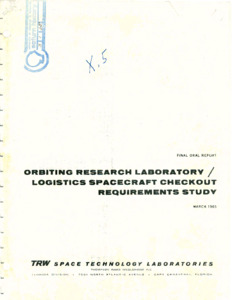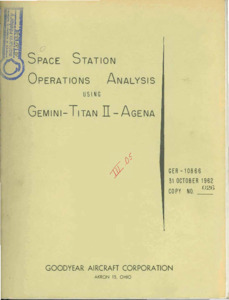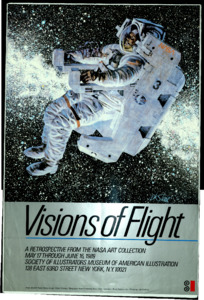
Browse Items (5 total)
Sort by:
-
"Orbiting research laboratory/logistics spacecraft checkout requirements study."
This report presents the results of the study of Orbiting Research Laboratory and Logistic Spacecraft Checkout Requirements as they relate to prelaunch operations at MILA. The study was performed jointly by the Florida Division and the Systems Research and Analysis Division of TRW Space Technology Laboratories for NASA under the terms of contract NAS10-1076. -
"Space Station operations analysis using Gemini-Titan II-Agena."
Copy No. 026. Ger-10866. -
Oral History Interview With John Ofenloch
John Ofenloch was born in Chicago, Ilinois and was raised there. He received his Bachelor's degree in Mechanical Engineering at Christian Brother's University in Memphis, Tennessee. When he graduated college, he accepted a job with North American Aviation in Downey, California. In Downey was the North American Aviation Space and Information Division which had the contract for the Apollo Command Service Module. Ofenloch's responsibility while he was out there was the Apollo Command Module Earth re-entry. His job was to make sure that the Command Module was capable of bringing the astronauts back safely to Earth. After he was through with the tests of the command module, he went to Brown Engineering in Huntsville, AL to work with zero gravity and the effects on the humans and the vehicle.Tags Oral History -
Visions of Flight....
Artwork of astronaut floating in space. Text at the bottom details an art exhibit featuring paintings about NASA history. -
Oral History Interview With Charles M. Louis
As a kid, Charles M. Louis loved to take things apart and put them back together. He also was inspired as a kid while reading a Life magazine article with Wernher Von Braun standing next to the Saturn V engine at the age of 15. Since he was an avid Science Fiction reader at the time, this all inspired him to become involved with the Space Program, and to eventually become a licensed hand radio operator. In college, he pursued an Electrical Engineering degree, and he flunked out of college becasue the classes were too big. Because of this, he decided to change schools and go to the Detroit Institue of Technology. There, he was more successful because of the smaller class sizes. After graduating college, he was hired at Boeing in Seattle, Washington. At Boeing, he was involved in Test Engineering supporting UHF and Microwave antennas on the Minuteman Program. Boeing then got a contract for the Saturn V Program 8 months after Charles started working there. He decided he would rather work on the Space Program then the military side, so he decided to move down to Huntsville, AL to work on the program.Tags Oral History



